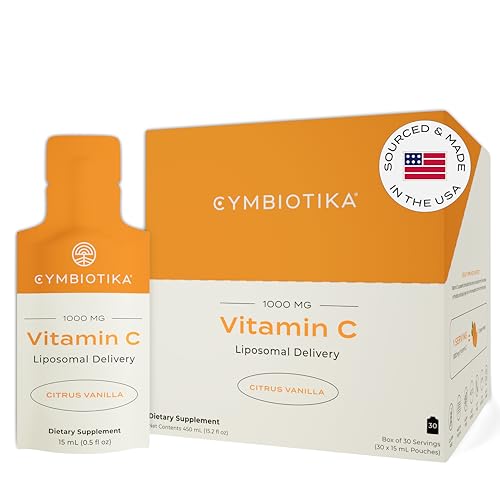
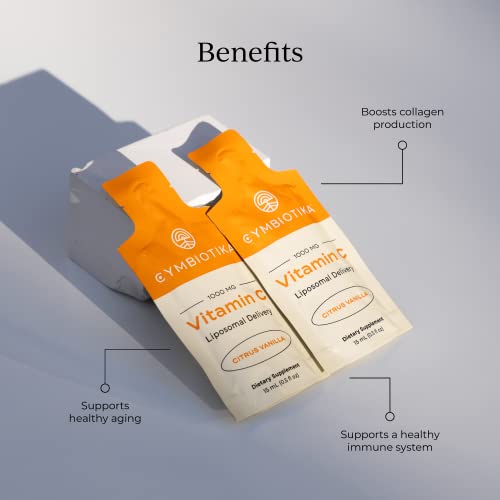
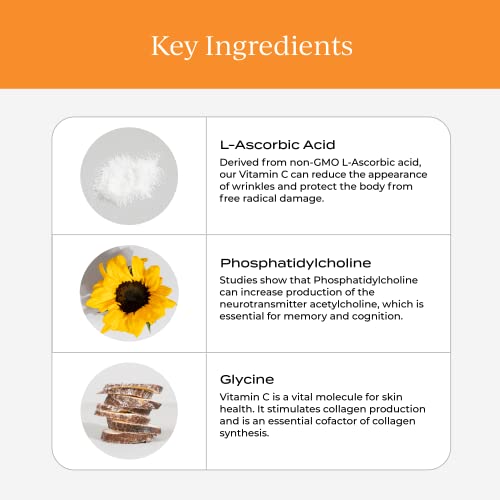
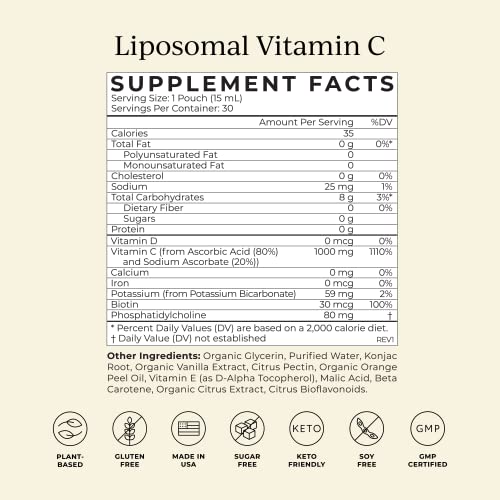

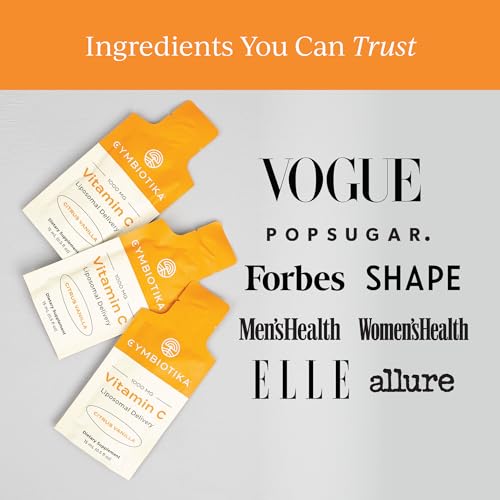
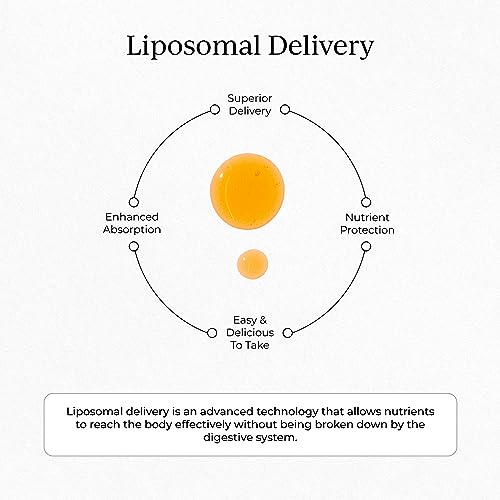
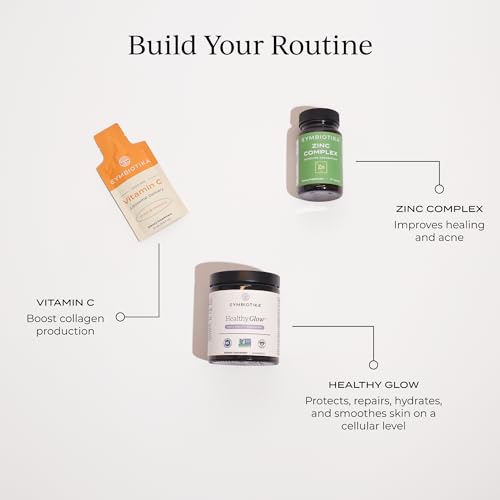
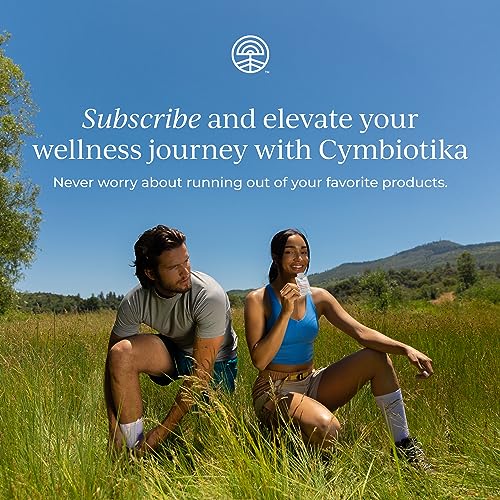
CYMBIOTIKA Liposomal Vitamin C Packets - Immune Support & Collagen Boost, Citrus Vanilla - 30ct


Malic Acid
High RiskMalic acid is a naturally occurring organic acid found in various fruits, particularly apples. It plays a role in the metabolic processes of living organisms and is commonly used as a flavoring agent, pH regulator, and preservative in food and cosmetic products.
Sustai Insights
Malic acid serves as an effective pH adjuster and flavor enhancer, contributing to the sensory profile of products. However, it may cause skin and eye irritation and has high use restrictions, limiting its application. Regulatory bodies have noted these concerns, leading to restrictions on its use in certain products. Overall, the ingredient is considered high risk due to these factors, necessitating careful usage and consideration of safer alternatives.
Sodium Ascorbate
Medium RiskSodium ascorbate is the sodium salt of ascorbic acid (vitamin C), commonly used as an antioxidant in food and cosmetic products. It helps stabilize formulations and enhance the shelf life of products by preventing oxidation.
Sustai Insights
Sodium ascorbate serves effectively as an antioxidant, enhancing product stability and shelf life. It is generally regarded as safe with low carcinogenic and reproductive toxicity risks; however, it may pose moderate allergy concerns. Environmental risks are minimal, with no significant pollutant or bioaccumulation potential. Regulatory bodies have not imposed significant restrictions, indicating a moderate overall risk level. For safer alternatives, consider natural antioxidants such as tocopherols (vitamin E).
Lecithin
Medium RiskLecithin is a naturally occurring lipid found in various plant and animal tissues, primarily composed of phospholipids. It serves as an emulsifier, stabilizing mixtures of oil and water, and is commonly used in food, cosmetics, and pharmaceuticals to improve texture and extend shelf life.
Sustai Insights
Lecithin provides functional benefits as an effective emulsifier and stabilizer, enhancing product texture while being sustainably sourced from natural origins. Health risks are generally low, with moderate concerns regarding allergies and immunotoxicity but minimal cancer or reproductive toxicity risks. Environmental hazards are limited, and it is not classified as a pollutant. Regulatory bodies impose few restrictions. Overall, lecithin presents a medium risk, suggesting caution in usage, especially for sensitive individuals. Alternatives include sunflower lecithin or other plant-based emulsifiers that may offer similar benefits with reduced allergenic potential.
Ascorbic Acid (Vitamin C)
Low RiskAscorbic acid (Vitamin C) is a naturally occurring antioxidant essential for various biological functions, including collagen synthesis and immune response. It is commonly used in cosmetic and food products for its preservative properties and ability to enhance skin brightness.
Sustai Insights
Ascorbic acid provides functional benefits as an effective antioxidant and preservative, contributing to skin health and product stability. It is generally recognized as safe with low health risks, including minimal concerns for carcinogenicity and allergies. Environmentally, it poses low risks, as it is biodegradable and does not bioaccumulate. Regulatory bodies like the FDA have not imposed significant restrictions on its use. Overall, the ingredient presents a low risk, with safe usage practices ensuring consumer safety, and alternatives such as natural extracts exist for those seeking different formulations.
Citrus Bioflavonoids
Low RiskCitrus bioflavonoids are a group of plant-derived compounds commonly found in citrus fruits. They are primarily known for their antioxidant properties and are often used in dietary supplements and cosmetic formulations to support skin health and overall wellness.
Sustai Insights
Citrus bioflavonoids offer functional benefits such as antioxidant activity and potential support for skin health. They are generally recognized as safe with low concerns for carcinogenicity, allergies, and reproductive toxicity. No significant environmental hazards have been identified, and they are not restricted by regulatory bodies. Overall, they present a low risk profile with no known severe adverse effects. Safe usage practices include adhering to recommended dosages. Alternatives are available, though citrus bioflavonoids are often valued for their specific benefits.
Biotin
Low RiskBiotin, also known as vitamin B7, is a water-soluble vitamin that plays a crucial role in the metabolism of carbohydrates, fats, and proteins. It is commonly used in dietary supplements and cosmetic products to support healthy hair, skin, and nails, due to its involvement in keratin synthesis.
Sustai Insights
Biotin is recognized for its functional benefits, particularly in promoting hair and skin health. It is generally considered safe, with low concerns regarding carcinogenicity, allergenic potential, and reproductive toxicity. Regulatory bodies such as the FDA have no significant restrictions on its use, and it is not associated with substantial environmental risks. Overall, biotin is assessed to be low risk, making it a viable ingredient in various formulations. Safe usage practices include adhering to recommended dosages, and alternatives may be considered for those seeking plant-based or vegan options.
Apple Pectin
Low RiskApple pectin is a natural polysaccharide found in the cell walls of apples. It is commonly used as a gelling agent, thickener, and stabilizer in food products, as well as in cosmetics and pharmaceuticals. Its gelling properties are utilized to improve texture and consistency.
Sustai Insights
Apple pectin serves as an effective thickener and stabilizer, contributing to the texture of various products. It is biodegradable and derived from renewable sources, enhancing its sustainability profile. Health risks are minimal, with low concerns for carcinogenicity, allergies, or reproductive toxicity. Environmental impact is also low, with no known pollutants or bioaccumulation issues. Regulatory status is clear, with no current restrictions. Overall, the risk level associated with apple pectin is low, making it a safe ingredient for use in formulations.
Tocopherol, D Alpha
Low RiskTocopherol, specifically d-alpha tocopherol, is a naturally occurring form of Vitamin E. It is commonly used in cosmetic and personal care products primarily for its antioxidant properties, helping to protect formulations from oxidation and extend shelf life.
Sustai Insights
D-alpha tocopherol provides effective antioxidant benefits, contributing to product stability. It is sustainably sourced and generally regarded as safe, with low concerns regarding carcinogenicity, allergies, and reproductive toxicity. However, there are minor concerns about endocrine disruption. Regulatory bodies have not imposed significant restrictions, indicating low overall risk. Recommended usage practices include adhering to established safe concentration thresholds. Alternatives, such as other forms of Vitamin E or plant-based antioxidants, may also be considered.
Potassium
Low RiskPotassium is a naturally occurring mineral essential for various biological functions, including maintaining fluid balance, muscle contractions, and nerve signaling. It is commonly used in food and cosmetic products as a salt substitute and to enhance product stability.
Sustai Insights
Potassium has functional benefits such as supporting hydration and overall cellular function. It is generally recognized as safe, with low concerns regarding carcinogenicity, allergies, and reproductive toxicity. Environmental risks are minimal, as it does not significantly contribute to pollution. Regulatory bodies have not imposed restrictions on its use. Overall, potassium is assessed as low risk, with safe usage practices recommended for optimal benefits.
Ci 75130
Low RiskBeta carotene is a carotenoid compound primarily sourced from fruits and vegetables that provides coloration and is a precursor to vitamin A. It is often used in food products, cosmetics, and dietary supplements for its antioxidant properties and potential health benefits.
Sustai Insights
Beta carotene is recognized for its role as an antioxidant and a source of vitamin A, contributing to skin health and immune function. It is derived from sustainable sources, though it has moderate bioaccumulation potential. Health risks are low, with no significant concerns regarding carcinogenicity, allergies, or reproductive toxicity. Regulatory bodies have noted its use restrictions, but overall, it presents low risks to health and the environment. Safe usage practices should be followed, and alternatives such as other carotenoids or natural colorants may be considered.
Sodium Ascorbate
Medium RiskSodium ascorbate is the sodium salt of ascorbic acid (vitamin C), commonly used as an antioxidant in food and cosmetic products. It helps stabilize formulations and enhance the shelf life of products by preventing oxidation.
Sustai Insights
Sodium ascorbate serves effectively as an antioxidant, enhancing product stability and shelf life. It is generally regarded as safe with low carcinogenic and reproductive toxicity risks; however, it may pose moderate allergy concerns. Environmental risks are minimal, with no significant pollutant or bioaccumulation potential. Regulatory bodies have not imposed significant restrictions, indicating a moderate overall risk level. For safer alternatives, consider natural antioxidants such as tocopherols (vitamin E).
Lecithin
Medium RiskLecithin is a naturally occurring lipid found in various plant and animal tissues, primarily composed of phospholipids. It serves as an emulsifier, stabilizing mixtures of oil and water, and is commonly used in food, cosmetics, and pharmaceuticals to improve texture and extend shelf life.
Sustai Insights
Lecithin provides functional benefits as an effective emulsifier and stabilizer, enhancing product texture while being sustainably sourced from natural origins. Health risks are generally low, with moderate concerns regarding allergies and immunotoxicity but minimal cancer or reproductive toxicity risks. Environmental hazards are limited, and it is not classified as a pollutant. Regulatory bodies impose few restrictions. Overall, lecithin presents a medium risk, suggesting caution in usage, especially for sensitive individuals. Alternatives include sunflower lecithin or other plant-based emulsifiers that may offer similar benefits with reduced allergenic potential.
Ascorbic Acid (Vitamin C)
Low RiskAscorbic acid (Vitamin C) is a naturally occurring antioxidant essential for various biological functions, including collagen synthesis and immune response. It is commonly used in cosmetic and food products for its preservative properties and ability to enhance skin brightness.
Sustai Insights
Ascorbic acid provides functional benefits as an effective antioxidant and preservative, contributing to skin health and product stability. It is generally recognized as safe with low health risks, including minimal concerns for carcinogenicity and allergies. Environmentally, it poses low risks, as it is biodegradable and does not bioaccumulate. Regulatory bodies like the FDA have not imposed significant restrictions on its use. Overall, the ingredient presents a low risk, with safe usage practices ensuring consumer safety, and alternatives such as natural extracts exist for those seeking different formulations.
Citrus Bioflavonoids
Low RiskCitrus bioflavonoids are a group of plant-derived compounds commonly found in citrus fruits. They are primarily known for their antioxidant properties and are often used in dietary supplements and cosmetic formulations to support skin health and overall wellness.
Sustai Insights
Citrus bioflavonoids offer functional benefits such as antioxidant activity and potential support for skin health. They are generally recognized as safe with low concerns for carcinogenicity, allergies, and reproductive toxicity. No significant environmental hazards have been identified, and they are not restricted by regulatory bodies. Overall, they present a low risk profile with no known severe adverse effects. Safe usage practices include adhering to recommended dosages. Alternatives are available, though citrus bioflavonoids are often valued for their specific benefits.
Malic Acid
High RiskMalic acid is a naturally occurring organic acid found in various fruits, particularly apples. It plays a role in the metabolic processes of living organisms and is commonly used as a flavoring agent, pH regulator, and preservative in food and cosmetic products.
Sustai Insights
Malic acid serves as an effective pH adjuster and flavor enhancer, contributing to the sensory profile of products. However, it may cause skin and eye irritation and has high use restrictions, limiting its application. Regulatory bodies have noted these concerns, leading to restrictions on its use in certain products. Overall, the ingredient is considered high risk due to these factors, necessitating careful usage and consideration of safer alternatives.
Biotin
Low RiskBiotin, also known as vitamin B7, is a water-soluble vitamin that plays a crucial role in the metabolism of carbohydrates, fats, and proteins. It is commonly used in dietary supplements and cosmetic products to support healthy hair, skin, and nails, due to its involvement in keratin synthesis.
Sustai Insights
Biotin is recognized for its functional benefits, particularly in promoting hair and skin health. It is generally considered safe, with low concerns regarding carcinogenicity, allergenic potential, and reproductive toxicity. Regulatory bodies such as the FDA have no significant restrictions on its use, and it is not associated with substantial environmental risks. Overall, biotin is assessed to be low risk, making it a viable ingredient in various formulations. Safe usage practices include adhering to recommended dosages, and alternatives may be considered for those seeking plant-based or vegan options.
Apple Pectin
Low RiskApple pectin is a natural polysaccharide found in the cell walls of apples. It is commonly used as a gelling agent, thickener, and stabilizer in food products, as well as in cosmetics and pharmaceuticals. Its gelling properties are utilized to improve texture and consistency.
Sustai Insights
Apple pectin serves as an effective thickener and stabilizer, contributing to the texture of various products. It is biodegradable and derived from renewable sources, enhancing its sustainability profile. Health risks are minimal, with low concerns for carcinogenicity, allergies, or reproductive toxicity. Environmental impact is also low, with no known pollutants or bioaccumulation issues. Regulatory status is clear, with no current restrictions. Overall, the risk level associated with apple pectin is low, making it a safe ingredient for use in formulations.
Tocopherol, D Alpha
Low RiskTocopherol, specifically d-alpha tocopherol, is a naturally occurring form of Vitamin E. It is commonly used in cosmetic and personal care products primarily for its antioxidant properties, helping to protect formulations from oxidation and extend shelf life.
Sustai Insights
D-alpha tocopherol provides effective antioxidant benefits, contributing to product stability. It is sustainably sourced and generally regarded as safe, with low concerns regarding carcinogenicity, allergies, and reproductive toxicity. However, there are minor concerns about endocrine disruption. Regulatory bodies have not imposed significant restrictions, indicating low overall risk. Recommended usage practices include adhering to established safe concentration thresholds. Alternatives, such as other forms of Vitamin E or plant-based antioxidants, may also be considered.
Potassium
Low RiskPotassium is a naturally occurring mineral essential for various biological functions, including maintaining fluid balance, muscle contractions, and nerve signaling. It is commonly used in food and cosmetic products as a salt substitute and to enhance product stability.
Sustai Insights
Potassium has functional benefits such as supporting hydration and overall cellular function. It is generally recognized as safe, with low concerns regarding carcinogenicity, allergies, and reproductive toxicity. Environmental risks are minimal, as it does not significantly contribute to pollution. Regulatory bodies have not imposed restrictions on its use. Overall, potassium is assessed as low risk, with safe usage practices recommended for optimal benefits.
Ci 75130
Low RiskBeta carotene is a carotenoid compound primarily sourced from fruits and vegetables that provides coloration and is a precursor to vitamin A. It is often used in food products, cosmetics, and dietary supplements for its antioxidant properties and potential health benefits.
Sustai Insights
Beta carotene is recognized for its role as an antioxidant and a source of vitamin A, contributing to skin health and immune function. It is derived from sustainable sources, though it has moderate bioaccumulation potential. Health risks are low, with no significant concerns regarding carcinogenicity, allergies, or reproductive toxicity. Regulatory bodies have noted its use restrictions, but overall, it presents low risks to health and the environment. Safe usage practices should be followed, and alternatives such as other carotenoids or natural colorants may be considered.
Discover the power of CYMBIOTIKA Vitamin C Individual Packets, designed for health-conscious consumers seeking immune support, collagen enhancement, and healthy aging. Each convenient packet features liposomal delivery, ensuring superior absorption for maximum benefits.
- Immune Support: Boost your immune system effectively with non-GMO l-Ascorbic acid, expertly formulated for optimal absorption.
- Collagen Production: Promote youthful skin and reduce wrinkles with essential nutrients that support collagen synthesis and hydration.
- Convenient & Versatile: Enjoy the citrus vanilla flavor directly, or mix it into your favorite beverages for a refreshing boost.
- Natural Ingredients: Formulated with vegan, clean ingredients, free from chemicals, additives, and preservatives, making it a safe choice for all.
- Trusted Brand: Cymbiotika combines scientific innovation with traditional wisdom, ensuring transparency and quality in every packet.
Elevate your wellness routine with these 30 easy-to-use packets that empower your journey to better health.
Subscribe & Save with Sustai
- Best Price Guarantee: Always enjoy the lowest prices on sustainable home essentials.
- No Surprises: We’ll notify you before shipping. No hidden fees, ever.
- You’re in Charge: Change, pause, or cancel your subscription anytime with ease.
- Eco-Friendly Deliveries: Our grouped shipments mean less packaging and lower emissions.
Join us on a sustainable journey. Special offers for a limited time! Prices and promotions may change.
Recommended Products
Discover the power of CYMBIOTIKA Vitamin C Individual Packets, designed for health-conscious consumers seeking immune support, collagen enhancement, and healthy aging. Each convenient packet features liposomal delivery, ensuring superior absorption for maximum benefits.
- Immune Support: Boost your immune system effectively with non-GMO l-Ascorbic acid, expertly formulated for optimal absorption.
- Collagen Production: Promote youthful skin and reduce wrinkles with essential nutrients that support collagen synthesis and hydration.
- Convenient & Versatile: Enjoy the citrus vanilla flavor directly, or mix it into your favorite beverages for a refreshing boost.
- Natural Ingredients: Formulated with vegan, clean ingredients, free from chemicals, additives, and preservatives, making it a safe choice for all.
- Trusted Brand: Cymbiotika combines scientific innovation with traditional wisdom, ensuring transparency and quality in every packet.
Elevate your wellness routine with these 30 easy-to-use packets that empower your journey to better health.

You can have at most 2 Sustainable Steals products in your cart
Customer Reviews
Customers’ View
Customers appreciate the convenience and effectiveness of Cymbiotika's Liposomal Vitamin C supplement, noting its great taste and easy-to-use packaging. Many highlight its positive impact on immune support, energy levels, and skin clarity, with users stating that it enhances overall health without the need for pills. The clean, vegan, and non-GMO ingredients align with eco-conscious values, making it a favorable choice for health-focused consumers. However, some users have experienced discomfort, such as nausea and stomach issues, prompting suggestions for improvement in formulation. Overall, this product is well-received for its health benefits, though users advise caution regarding personal tolerance.
AI-generated from the text of customer reviewsThis product is rated 5.0 of 5.0 stars.
It has received 4 reviews.




